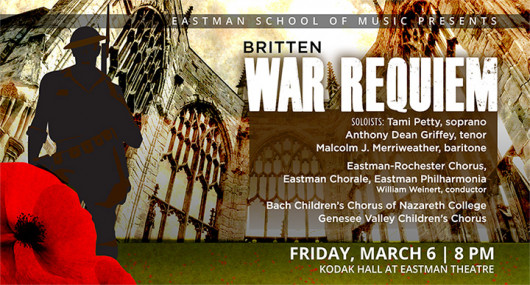 Benjamin Britten’s War Requiem, a powerful choral masterpiece denouncing war and honoring the fallen, will be presented by the Eastman School of Music at 8 p.m. Friday, March 6, in Kodak Hall at Eastman Theatre, with the concert serving as a benefit for UNICEF.
Benjamin Britten’s War Requiem, a powerful choral masterpiece denouncing war and honoring the fallen, will be presented by the Eastman School of Music at 8 p.m. Friday, March 6, in Kodak Hall at Eastman Theatre, with the concert serving as a benefit for UNICEF.
Requiring two orchestras, a symphonic chorus, a children’s chorus, and soloists, War Requiem is a large-scale work, that due to its size is rarely performed. Eastman is proud to bring this mammoth concert to Rochester. Featured groups are Eastman-Rochester Chorus, Eastman Chorale, Eastman Philharmonia, Bach Children’s Chorus of Nazareth College and Genesee Valley Children’s Choir, as well as three Eastman alumni as soloists; Tami Petty ‘96E (MM) ‘06E (DMA), soprano; Anthony Dean Griffey ‘01E (MM), tenor; and Malcolm J. Merriweather ‘10E (MM), baritone. William Weinert, Chair of the Conducting and Ensembles Department at Eastman as well as Director of Choral Activities, will serve as conductor.
“The War Requiem is Britten’s most significant concert work, and the work that brought him the most widespread acclaim during his lifetime. It is also the most important musical work ever written with an anti-war message,” said Weinert. “The genius of Britten’s artistry is his ability to present complex music and profound poetry with the kind of perfect clarity that makes an immediate and unforgettable impact on listeners.”
The War Requiem was commissioned to celebrate the opening of the new Coventry Cathedral, built to replace the 14th-century structure destroyed during a World War II bombing raid in 1940. The work’s premiere on May 30, 1962, was a triumph, and subsequent performances were acclaimed by critics and audiences in England and abroad.
The 90-minute work consists of six movements that intersperses Britten’s setting of the traditional Latin Mass for the Dead with poems by English poet and World War I soldier Wilfred Owen, who was killed one week before the Armistice was signed. The musicians and singers are divided into three groups that alternate and interact with each other throughout. The ensembles and soloists join together only in the final movement.
The scope of the piece and Britten’s dramatic juxtaposition of traditional texts and harmonies with Owen’s graphic poetry build a powerful work that echoes Britten’s anti-war convictions. To symbolize wartime losses across boundaries and the importance of reconciliation, Britten wrote the piece for three specific soloists: German baritone Dietrich Fischer-Dieskau; Russian soprano Galina Vishnevskaya; and British tenor Peter Pears.
Britten War Requiem is free and open to the public. While admission is free, donations are greatly appreciated as this event benefits UNICEF.
# # #
About Eastman School of Music:
The Eastman School of Music was founded in 1921 by industrialist and philanthropist George Eastman (1854-1932), founder of Eastman Kodak Company. It was the first professional school of the University of Rochester. Mr. Eastman’s dream was that his school would provide a broad education in the liberal arts as well as superb musical training. The current dean is Jamal Rossi, appointed in 2014.
More than 900 students are enrolled in the Collegiate Division of the Eastman School of Music—about 500 undergraduates and 400 graduate students. They come from almost every state, and approximately 23 percent are from other countries. They are taught by a faculty comprised of more than 130 highly regarded performers, composers, conductors, scholars, and educators. They are Pulitzer Prize winners, Grammy winners, Emmy winners, Guggenheim fellows, ASCAP Award recipients, published authors, recording artists, and acclaimed musicians who have performed in the world’s greatest concert halls. Each year, Eastman’s students, faculty members, and guest artists present more than 900 concerts to the Rochester community.
